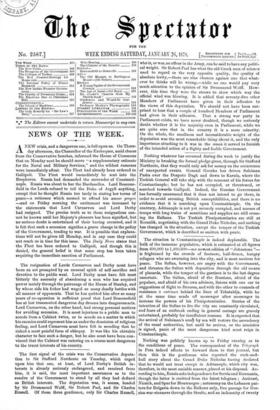The resignation of Lords Carnarvon and Derby must have been
an act prompted by an unusual spirit of self-sacrifice and devotion to the public weal. Lord Derby must have felt most 'bitterly the necessity of abandoning a man who has acquired power mainly through the patronage of the House of Stanley, and by whose side his father had waged so many deadly battles with all manner of opponents. That he has quitted him after so many -years of co-operation is sufficient proof that Lord Beaconsfield bas at last transmuted dangerous day dreams into dangerous acts. Lord Carnarvon, on the other hand, had strong personal motives for avoiding secession. It is most injurious to a public man to secede from a Cabinet twice, or to secede on a matter in which bis enemies could represent him as under the dominion of religious feeling, and Lord Carnarvon must have felt in seceding that he risked a most painful form of obloquy. It was like his chivalric character to face such a danger, but he also must have been con- vinced that the Cabinet was entering on a course most dangerous to the truest interests of his country.


































